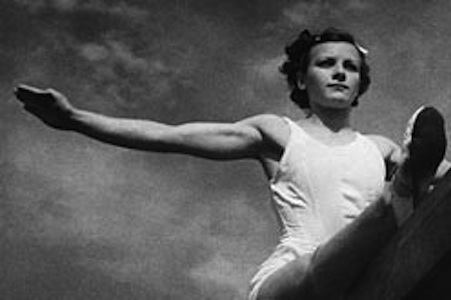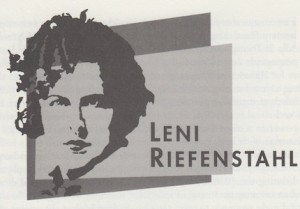Born: August 22, 1902, Berlin, Germany
[Died: September 8, 2003, Pöcking, Germany]
Film is the greatest medium for propaganda ever invented.
—Joseph Goebbels
Among the most tragic and bewildering stories in film history is the career of Leni Riefenstahl. A director whose captivating films set artistic standards in the medium, she was eventually banished from her country and from her trade, living the rest of her life under a merciless cloud of controversy. Her misfortune was partly a historical one: her rise to glory as a director of international acclaim coincided with the rise of Nazi Germany’s bid for world domination.
The Film 100
1. W.K. Laurie Dickson
2 Edwin S. Porter
3. Charlie Chaplin
4. Mary Pickford
5. Orson Welles
6. Alfred Hitchcock
7. Walt Disney
8. D.W. Griffith
9. Will Hays
10 Thomas Edison
11. John Wayne
12. J.R. Bray
13. Billy Bitzer
14. Jesse Lasky
15. George Eastman
16. Sergei Eisenstein
17. André Bazin
18. Irving Thalberg
19. Thomas Ince
20. Marlon Brando
21. Louis B. Mayer
22. Greta Garbo
23. Robert Flaherty
24. Lon Chaney
25. Anita Loos
26. George Méliès
27. Adolph Zukor
28. John Gilbert
29. Max Fleischer
30. John Ford
31. William Fox
32. George Lucas
33. Linwood Gale Dunn
34. Eadweard Muybridge
35. Katharine Hepburn
36. Winsor McCay
37. Stanley Kubrick
38. Buster Keaton
39. James Agee
40. Fritz Lang
41. Marcus Loew
42. Cedric Gibbons
43. James Cagney
44. Ben Hecht
45. Ingmar Bergman
46. Humphrey Bogart
47. Leon Schlesinger
48. Louella Parsons
49. Roger Corman
50. Edith Head
51. Bernard Herrmann
52. Gary Cooper
53. Mike Todd
54. Ernst Lubitsch
55. Sidney Poitier
56. Saul Bass
57. Billy Wilder
58. Bette Davis
59. Erich von Stroheim
60. Max Factor
61. Auguste and Louis Lumière
62. Woody Allen
63. Clark Gable
64. David O. Selznick
65. Gregg Toland
66. Lillian Gish
67. William Cameron Menzies
68. Lucille Ball
69. Samuel Rothafel
70. Akira Kurosawa
71. Marilyn Monroe
72. Vittorio De Sica
73. Natalie Kalmus
74. Gene Siskel and Roger Ebert
75. Willis O’Brien
76. Shirley Temple
77. Yakima Canutt
78. Sam Peckinpah
79. Jackie Coogan
80. Federico Fellini
81. Leni Riefenstahl
82. Steven Spielberg
83. Sam Warner
84. Jean-Luc Godard
85. Robert De Niro
86. Fred Astaire
87. Francis Ford Coppola
88. Ted Turner
89. Clint Eastwood
90. Dalton Trumbo
91. Dennis Hopper
92. Richard Hollingshead
93. Melvin Van Peebles
94. John Chambers
95. Mack Sennett
96. Martin Scorsese
97. Karl Struss
98. Busby Berkeley
99. John Hubley
100. John Cassavetes
Leni Riefenstahl was a young ballerina who began dancing in the ethereal mountaineering pictures of director Arnold Fanck in the golden age of German cinematic production. A screen actress of incredibly magnetic allure, with a following as enthusiastic of Dietrich’s, Riefenstahl became obsessed with directing. She passed on several offers to act in Hollywood; instead, she grabbed a camera and headed outdoors to begin filming.
With Fanck’s encouragement, she formed a production company in 1931 and directed herself in The Blue Light (1932), a magical alpine fable. Like Fanck, she had an innate sense of natural lighting and instinctively knew how to photograph the Alps to capture nature’s pageantry, but there was visual drama in her indoor setups, too. After much experimentation and guidance from Fanck, she also showed a unique talent for editing. It looked as if Riefenstahl would become one of the world’s premiere feature filmmakers.
Her international reputation, however, would come from her first effort at documentary filmmaking, commissioned as a record of the 1934 Nürnberg Nazi rally. If Triumph of the Will (1934) was indeed pure propaganda, then pure propaganda never looked so good. Riefenstahl rehearsed extensively to prepare for Hitler’s now-famous speech, digging trenches for low-angle shots, building towers for long crowd shots. Then, she edited the images against a soundtrack of marching goosesteppers. The result was a film of rare emotional and visual magnetism. In its propaganda aspect, the film showcased Nazi power to a naïve German public, emphasizing unity, superiority and the charisma of its leader, Adolf Hitler.
Hitler’s regime rewarded Riefenstahl with additional funding and equipment for Olympiad (1938), a study in the beauty of the Aryan physique filmed during the 1936 Olympic games. Once again, Riefenstahl demonstrated an uncanny command of emotional reactions to imagery. She shot a beautiful nude sequence to open the film, looking back at the origins of the modern Olympics in the ancient games. Her Greece was filled with blond-haired, blue-eyed athletes. Still, the compositions were all interesting, and the film launched widely influential techniques in sports photography that are universally used today in television sports broadcasting. Experimenting extensively, she strapped the camera to everything—moving automobiles, ascending balloons, elevator lifts. Extreme close-ups, low angles and montage were used gratuitously. She applied the rich sound and lighting techniques used in fictional movies when shooting real life events, extruding documentary footage of high visual impact. No later film about sports has been able to resist the use of Riefenstahl’s seminal camera angles and heroic framing. Many directors have credited Riefenstahl’s impact on their films; George Lucas has said that the final ceremony in Star Wars is taken shot for shot from the presentation of medals in Olympiad.
Riefenstahl’s effectiveness backfired in the aftermath of World War II. Her apparent collaboration with the Nazi cause made her persona non grata in postwar Germany, and she was threatened with physical harm. She fled to France, where the government briefly imprisoned her. She lived and worked in Africa for nearly two decades before returning to her homeland. Despite every effort to distance herself from the Third Reich, Riefenstahl was castigated by her fans, shunned by the film industry and deprived of all opportunity to continue practicing her craft.
For the remainder of her ninety-two years, speculation of her knowledge about Hitler’s primary aim has loomed over her. In 1982, she participated in a lengthy documentary that attempted to separate the driven artist from the Nazi conspirator, but did little to restore her image. According to Riefenstahl, when she was a young director she was approached by Minister of Propaganda Joseph Goebbels, who never clearly stated his intentions.
Despite her vehement denials to the contrary, historians point to memos between Hitler and Riefenstahl, as well as testimony from survivors, suggesting she clearly understood the assignments. One writer said of Riefenstahl’s role in moving mass audiences, “Only a naïf or rank opportunist could have so disingenuously separated the medium from its message.”
Political motivations aside, she was a filmmaker of immeasurable potential. Had she not become synonymous with Hitler’s mesmerizing image, she could have become an unstoppable creative force. Other than Orson Welles, she is probably the most untapped filmmaking talent to date, and her work is studied more than any other documentary director’s. She is exemplary among women in the trade, and her genius has been cited by directors the world over. Her influence can be seen weekly in the sports broadcasts that borrow heavily from her point-of-view angles, slow-motion sequences, aerial shots and underwater photography. Her mystical images of nature continually show up in fantasy films and dream sequences.
Her ranking on this list suffers only because of her limited output and the relatively small number of movie lovers who have been exposed to her documentaries. Leni Riefenstahl influenced filmmakers in one other important way: after Triumph, documentary filmmakers could no longer be passive observers. Their medium would inherit a whole new scrutiny, as audiences tried to determine the slant of their supposedly objective viewpoint. At the core of her infamy is the question of a director’s social responsibility.
To read all the republished articles from ‘The Film 100,’ go to Reintroducing the Film 100 here on Keyframe.





